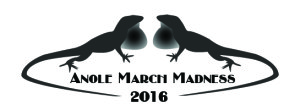

| Online: | |
| Visits: | |
| Stories: |
State of Anole Knowledge: Insights from Anole March Madness
W e just wrapped up our Anole March Madness tournament in which we brought to you many fictional battles of mainland and island anoles. We researched each species included in the tournament and highlighted some little-known facts about the participants. We told you about dewlap colors, ecomorphs, habitat use, invasion, body patterns and colors, and much more. But finding this information for each species was more challenging than we originally expected. The state of anole knowledge is certainly imbalanced.
e just wrapped up our Anole March Madness tournament in which we brought to you many fictional battles of mainland and island anoles. We researched each species included in the tournament and highlighted some little-known facts about the participants. We told you about dewlap colors, ecomorphs, habitat use, invasion, body patterns and colors, and much more. But finding this information for each species was more challenging than we originally expected. The state of anole knowledge is certainly imbalanced.
Looking at the number of Google Scholar citations for each species shows just how imbalanced our knowledge of different species of anoles is. Of the species we included, only three of the mainland species had more than 200 citations and none had more than 600. In contrast, of the island species, six had more than 200 citations and Anolis cristatellus had a whopping 1230 citations! Within regions there is quite an imbalance, too–check out how many more studies there are on Central American species compared to South American species (orange and red) and on Greater Antillean species compared to Lesser Antillean species (light and dark blue). This is perhaps unsurprising to many. We all know that anole research tends to be biased towards Caribbean species, but it was surprising to me how large this bias is!
This gives a sense of how much information is available for the species we highlighted in our tournament. For a few species, we were not even able to find photos (at least with appropriate usage rights) and for many the only information we could find was native range, color, and body size. For example, Anolis placidus had only five Google Scholar citations to go by, few images (other than specimens), and really no ecological information other than its ecomorph. But it must be named the “Placid Anole” for a reason, right? So we ran with that. Even with the paucity of information for some species, we were able to piece together some interesting stories highlighting some of the unique adaptations, ecology, and morphology. Here are some of my favorites with links for more information.
Anolis aquaticus and Anolis macrolepis were our two representative aquatic anoles. These species are adapted to streamside living, using the boulders as foraging grounds and for quick escape from predators–swimming, running across water, and even remaining submerged to get away from a threat! We used these behaviors in our stories–allowing both species to have sure footing in their stream side home and escape into the water when necessary.
Another unique anole we featured was Anolis onca, the only anole to have lost its toepads entirely. Anolis onca is adapted to a beachy life, making its home in sandy substrates and perching on bushes. We played this as a strength in round 1. It’s not clear what the functional reason for the loss of lamellae is–as has been suggested on Anole Annals, perhaps the sand renders lamellae or setae useless. The reasons for this morphological outlier are yet to be explored, but we figured A. onca must have an advantage in the sand over other anoles!
On behalf of all of the contributors to Anole March Madness 2016 we thank you for playing along with us. We hope to bring you another tournament next year, so let us know if you want to help make that happen!
Source: http://www.anoleannals.org/2016/04/11/state-of-anole-knowledge-insights-from-anole-march-madness/









